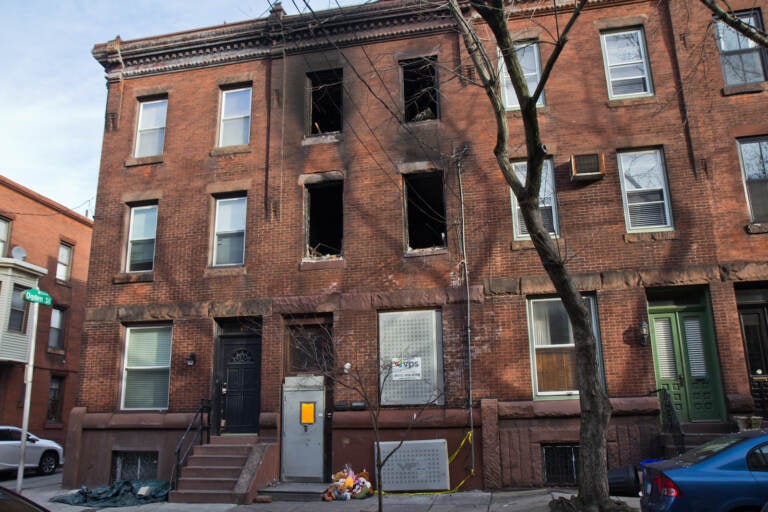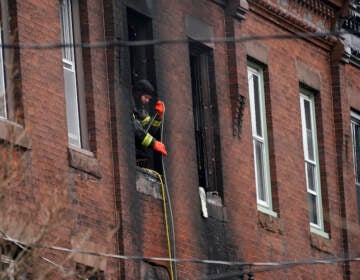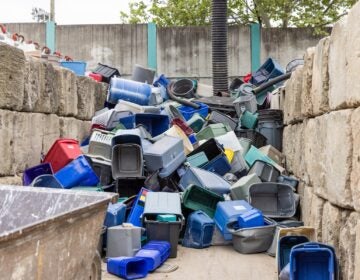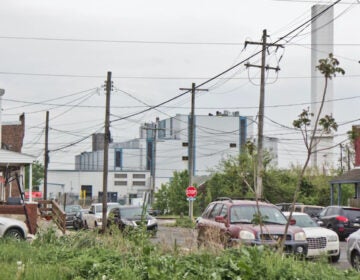Philly’s first legislative response to deadly Fairmount fire is a proposed tax credit for landlords
Philadelphia officials have publicly mourned the loss of life but said nothing concrete about changes to fire safety policy before now.

Teddy bears are placed outside the North 23rd Street rowhouse where 12 people lost their lives in a Jan. 5 fire. (Kimberly Paynter/WHYY)
A bill moving through City Council would effectively reimburse property owners and landlords who purchase and install fire-escape ladders in their apartments.
If passed, they would be repaid — potentially in full — in the form of a business tax credit, as long as they comply with the terms of the legislation, which includes agreeing to properly maintain the ladder.
Fire escape ladders, which are made from a variety of materials, can range in price from below $100 to more than $1,000.
The measure, introduced on Thursday, comes two weeks after a fast-moving rowhouse fire in Fairmount killed 12 people, including nine children. And days after hundreds of mourners packed Temple University’s Liacouras Center for a public funeral service celebrating their lives.
The building, owned by the Philadelphia Housing Authority, did not have a fire escape. And a spokesperson for the Philadelphia Fire Department said investigators did not recover a fire-escape ladder from the family’s apartment. Philadelphia does not require buildings of any size to have a fire escape. In the weeks since the devastating fire, elected officials have publicly mourned the loss of life but said nothing concrete about changes to fire safety policy before now.
Council President Darrell Clarke acknowledged that his legislation would not lead to significant change.
“This is one small step, but anything that induces property owners to add additional fire safety measures inside their properties is important and worth doing,” Clarke said. “We will continue doing anything within our power to make residential properties safe from fire for every resident of our city.”
Under the bill, interested landlords and property owners would be required to submit their plans to install any escape ladder to the city’s Department of Licenses and Inspections.
The bill, geared towards multi-family apartment buildings, also calls for an engineer or qualified professional to confirm in writing that the ladder is safe for the property in question, positioned near a window or another point of egress, and meets other safety regulations established by the city.
A property owner or landlord who fails to properly maintain the ladder would be required to repay the tax credits to the city, unless the city determined the ladder was compromised as a result of a natural disaster or “other act of God,” an act of terrorism or vandalism, or “circumstances beyond the control of the landlord or property owner.”
The measure does not say whether landlords and property owners can claim a tax credit for each ladder they install, but indicates the tax credit will be limited to a certain dollar amount.
Clarke said those details will be worked out before the bill goes up for a vote.
“Anything we do in the government, the bean counters tend to have the final say,” Clarke said in an interview. “We personally think that the cost associated with this can’t ever be too high and we need to be in the position to keep people safe.”
Either way, Greg Wertman, president of HAPCO Philadelphia, which represents many of the city’s small and midsize landlords, said he expects his members will volunteer to participate in the program.
“I definitely think people will step up,” Wertman said. “It’s gonna come down to the dollar amount and how hard it’s gonna be to jump through the hoops that they set up. I’m hoping they make it a rather simple process.”
The deadly fire broke out in the top unit of a duplex shortly before 7 a.m. on Jan. 5. Firefighters arrived within minutes, but were unable to contain the blaze before it claimed the lives of three sisters and their young children, the oldest of which was 16 years old.
Fire officials say it took less than three minutes for the fire to become “untenable,” and that the only means of egress for the family was the property’s front door and a back door in the basement.
The PHA building had battery-powered smoke alarms that weren’t working, no sprinkler system, and no fire extinguisher.
Safety features like hard-wired smoke detectors and sprinklers are not required under city code for older two-family duplexes like the one that burned, but some of these features are required for newer or larger residential buildings.
 WHYY is one of over 20 news organizations producing Broke in Philly, a collaborative reporting project on solutions to poverty and the city’s push towards economic justice. Follow us at @BrokeInPhilly.
WHYY is one of over 20 news organizations producing Broke in Philly, a collaborative reporting project on solutions to poverty and the city’s push towards economic justice. Follow us at @BrokeInPhilly.

Subscribe to PlanPhilly
WHYY is your source for fact-based, in-depth journalism and information. As a nonprofit organization, we rely on financial support from readers like you. Please give today.









